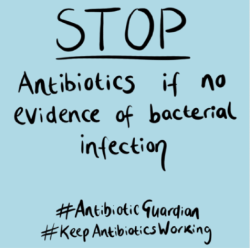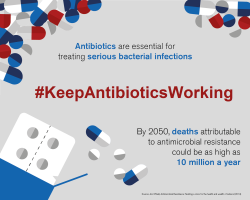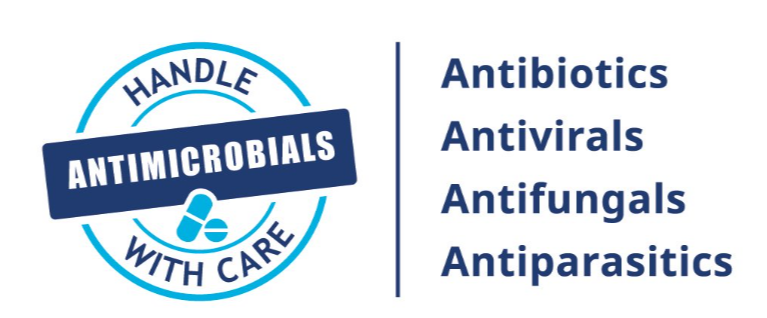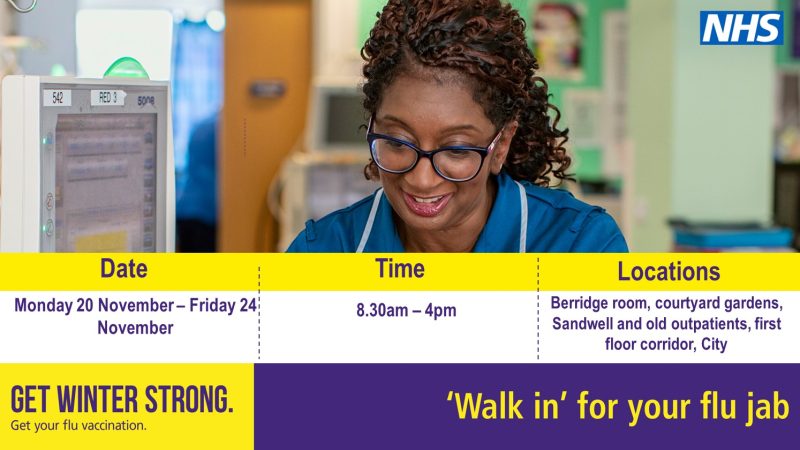Monthly archives: November 2023
World AMR Awareness Week (WAAW)- Antimicrobials In Clinical Practice

WAAW aims to raise awareness of antimicrobial resistance (AMR) – one of the leading risks to human health.
Today’s theme is ANTIMICROBIALS IN CLINICAL PRACTICE
Antimicrobials are fundamental to medical practice – but they are not a panacea to be used blindly. Our patients need the RIGHT agent, at the RIGHT dose, for the RIGHT duration by the RIGHT route.
Key national messages this WAAW:
- Refer to our Trust guidelines when selecting an antimicrobial.
- Clearly document a course length or a review date.
- Review regularly and consider switching IV to oral in line with new national guidelines
- A recent audit at UHB showed IV agents take more than sixteen times longer to administer than oral (22 minutes vs 80 seconds).
Would you like to know more?
Consider watching this Health Education England video on antibiotic prescribing in secondary care and reviewing the national Start smart – then focus guidelines (summarised below).
| START SMART | THEN FOCUS |
| · Do not start antibiotics in the absence of clinical evidence of bacterial infection
· Take cultures before antibiotic administration (do not delay antibiotics) · Check allergy history · Review previous microbiology · Adhere to SWB policies and guidelines · Document exact indication and duration of therapy in Unity · Give first dose within 1 hour for severe/life-threatening infections · Consult the duty microbiologist when appropriate. |
· At 48-72 hours review clinical diagnosis and continuing need for antimicrobials, and document clear plan of action in Unity. Please check culture and sensitivity results before starting antibiotics.
· STOP antibiotics if no evidence of infection · SWITCH from IV to oral therapy · CHANGE antibiotics: de-escalate/substitute/add agents as per culture results · CONTINUE and review again after a further 24 hours · CONSIDER potential for Outpatient Parenteral Antimicrobial Therapy |
Looking to carry out a research project? Apply for funding!
R&D are inviting SWB employees to apply for research funding for an initial period of one year, with the potential for an extension to two years maximum. This could be for a number of projects, including PAs, research fellows and WTE funding, but must be linked to a specific project. Additionally, funding must be for posts and not equipment, though minor consumables will be considered.
R&D have secured a total of £300,000 to fund these posts and research projects. Whilst applications are not capped, it is envisaged that more than one project will be funded through the scheme. The team expect any funded projects to align to the Trust R&D strategy, ‘Saving Lives through Research 23-27′, working collaboratively with an academic partner. If the academic partnership is with Aston university, lead applicants will also be considered for an honorary post through this scheme.
Here are some pointers:
- A collaborative approach across departments/directorates is encouraged.
- Each application to the scheme will require a named lead who will take overall responsibility for delivery.
- Funding for all types of posts will be considered i.e. research fellows, PAs, AfC wte.
- Applications should demonstrate clear benefit to local population served as well as demonstrate the ability for the project to be scaled up.
- It is expected that if successful the project/post holder will submit applications for further external competitive research funding.
- Projects and roles should be clearly aligned with the Trust R&D Strategy.
Next steps
This is an exciting opportunity for suitable candidates to make a real difference in research. The instigation of NHS research fellowships will strengthen the trusts position as an active leader in NHS clinical research, creating an environment which will attract leading staff committed to ensuring our patients and local population are provided with the highest standard of care.
To apply, please download an application form and return returned to Kelly Hard (kellyhard@nhs.net) by 1 December 2023 . Interviews/pitches will be held w/c 8 January 2024. Derek Connolly, Hoda Harb or Kelly Hard are very happy to have informal discussions with interested candidates and can be contacted through email.
Are you docking your glucose-ketone meters daily and updating in between to ensure timely transfer of patient results to UNITY?
To ensure a smooth transfer of patient data, results, and staff access to the meters, they must be docked daily.
In the meantime, results are also pushed out to UNITY using the wireless transfer function.
How do I activate the wireless transfer?
Results will be automatically transferred at three points:
- After each test has been taken.
- Upon being powered off.
- If results are pending on power-up.
Please allow the black arrows to cross the screen – this will send all outstanding results straight to UNITY. The meter will switch to standby mode after use and will switch itself off.
For further information or if you feel you need support on this, please email the point of care team at swb-tr.swbh-poct@nhs.net or call ext. 5352.
Managing change with Meagan

Midland Met is the talk of the town, and rightly so. Our new acute hospital is set to open in 2024, so we caught up with Meagan Fernandes, Director of People and OD, as she visited Midland Met.
Midland Met has been designed to maximise both patient benefits and staff wellbeing, with each area thoughtfully planned. “I understand how important it is for colleagues to have a place to relax and unwind,” Meagan explained.
As she looked around, she was impressed by the rest areas for colleagues and the Winter Garden on level 5, a unique floor in the building as it’s the only non-clinical area. “There are spaces available, such as the main restaurant area, an outdoor route around the Winter Garden perfect for walks, and the spiritual care centre. It’s somewhere everyone can feel at ease during their busy workdays and take a break away from their wards.”
Meagan emphasised the importance of the work we need to do before we open Midland Met next year. In particular, she urged people managers to book onto the management of change training available to help navigate this transition successfully with their teams.
Meagan remarked: “If you are a manager leading on a management of change process, we encourage you to book a space on a virtual training session, which explores the emotional and behavioural responses to change and identifies ways to support your colleagues.”
The following training sessions are available for managers to attend.
27 November 2023
- 9.30am – 11am – Creating psychological safety through change.
- 11.30am – 1pm – Holding difficult conversations.
- 1.30pm – 3pm – Managing wellbeing.
- 3.30pm – 5pm – Solution focused approach.
The full schedule of training dates is available here.
To secure your place, please visit Change Training – MMUH or email swbh.hrchangemanagement@nhs.net.
Clinical colleagues – have you completed your staff survey?

There is still time for everyone to do their staff survey and did you know you can win £50 worth vouchers for completing it!
Be sure to check out this sort video featuring our Chief Medical Officer, Dr Mark Anderson talking about the importance for clinical staff to complete the staff survey if they haven’t done so already.
Samosa sale
The cancer services team will be hosting a samosa sale on Friday 1 December from 11.30am – 1.00pm, in Main reception at Sandwell
If you would like to find our more information, please contact jennifer.donovan@nhs.net or call 0121 507 2776
World AMR Awareness Week (WAAW)- Prevention

WAAW aims to raise awareness of antimicrobial resistance (AMR) – one of the leading risks to human health.
Today’s theme is PREVENTION
At SWB we are reminding our staff to adhere to robust infection control practices. Preventing the spread of organisms is fundamental to preventing healthcare-associated infections (HCAI) and antimicrobial resistance (AMR).
The growing number of healthcare-associated infections caused by drug resistant organisms (such as carbapenem-resistant bacteria (CPE/CRO), multi-drug resistant Acinetobacter baumannii or Pseudomonas aeruginosa) pose a significant threat to public health.
Hand washing is the simplest and most effective way of preventing healthcare-associated infections. It protects our patients, reduces antibiotic use, and slows the spread of antimicrobial resistant bacteria.
Vital hygiene measures to be aware of:
- Hand hygiene: The 5 WHO moments
- Correct use of Personal Protective Equipment (PPE)
- Environmental cleaning
- Compliance with Aseptic Non-Touch Techniques
- Correct management of indwelling devices
All colleagues at SWB have a responsibility to ensure they are compliant with and adhere to infection prevention and control policies, procedures and guidelines. Robust infection prevention and hand hygiene practices protect our patients.
European Antibiotic Awareness Day (EAAD) and World AMR Awareness Week (WAAW) 18-24 November 2023


EAAD and WAAW aim to raise awareness of antimicrobial resistance (AMR) – one of the leading risks to human health.
Increasing resistance is making infections more difficult to treat – prolonging hospital stays and increasing morbidity/mortality. A recent analysis of worldwide AMR in 2019 attributed ~1.27 million deaths to bacterial resistance. The UK govt. commissioned “Review on Antimicrobial Resistance” estimates this could grow to 10 million deaths a year by 2050 unless action is taken. A staggering one person every three seconds.
But antimicrobials also underpin much of modern medicine: if they lose their effectiveness, many routine therapies could become too dangerous to perform:
- Immunosuppressing treatments such as chemotherapy could become life-threatening.
- Over 500,000 surgeries could become life-threatening.
(including joint replacements, c-sections, colorectal surgeries and gall bladder removals) - Surgical site infections would double.
Antimicrobial use drives antimicrobial resistance – and inappropriate use accelerates resistance. Everyone needs to get involved to prevent antimicrobial resistance. Small, individual changes add up and can help to avert this ‘silent pandemic’.
What can you do?
- Get SWB infection guidelines on your phone with the MicroGuide app (Android / iOS)
- Test yourself with this UKHSA quiz
- Become an Antibiotic Guardian
- Learn about appropriate antibiotic prescribing with this HEE video
- Learn more about AMR with this free University of Manchester module.
SWB Trust Comms Team shortlisted for national award
Embedded across the organisation the Trust comms team quietly work away to support colleagues in sharing good practice and translating complex information into messages that engage with our patients, people and population.
They are a resource which is available to all teams in practice either face to face or on call 24 hours a day, seven days a week. They work to fundamental principles of protecting our reputation, portraying our people as positive role models and leaders and producing high quality materials. Their output is measured rigorously and matched against others and they work to a challenging set of KPIs that celebrates diversity, inclusion and keeps the Trust values of Ambition, Respect and Compassion as their cornerstone. So it is no surprise that the team have been shortlisted for a national award as Comms Team of the Year at the Comms2Point0 2023 Unawards – one of the most respected in the world of comms.
The team are not an island, they would be unable to achieve their success across the many platforms they work without the partnership they enjoy with other teams – significantly with medical illustration – but also the clinical and corporate teams that provide the stories for the team to create their engaging content.
To help the Trust achieve national recognition of the high standard of our comms, please vote for them, so we can bring home validation of our comms strategy. To vote please click here
← Older items Newer items →
